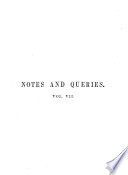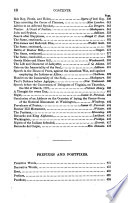 Three poets in three distant ages born, Greece, Italy, and England did adorn : The first in loftiness of thought surpassed ; The next in majesty ; in both the last. The force of Nature could no further go, To make a third she joined the other two. Three poets in three distant ages born, Greece, Italy, and England did adorn : The first in loftiness of thought surpassed ; The next in majesty ; in both the last. The force of Nature could no further go, To make a third she joined the other two.  THE LIFE OF SAMUEL JOHNSON, LL.D - Page 66by JAMES BOSWELL - 1892Full view THE LIFE OF SAMUEL JOHNSON, LL.D - Page 66by JAMES BOSWELL - 1892Full view - About this book
 | 1853 - 748 pages
...JP [Shakspeare's King Lear, Act IV. Sc. 1.] Quotation wanted. — Who is the author of the following lines ? — " Three poets in three distant ages born,...England did adorn : The first in loftiness of thought surpassed, The next in majesty ; in both the last. The force of Nature could no further go ; To make... | |
 | Edwin Owen Jones - 1853 - 258 pages
...great author the merit of having combined the beauties of his most illustrious predecessors : — " Three poets, in three distant ages born, Greece, Italy,...England did adorn ; The first in loftiness of thought surpassed, The next, in majesty ; in both, the last. The force of nature could no farther go ; To make... | |
 | David Bates Tower, Cornelius Walker - 1854 - 440 pages
...we eanno' do better than to conclude what we would say with the following stanza : — ON MILTON. " Three poets in three distant ages born, Greece, Italy,...England, did adorn. The first in loftiness of thought surpassed j The next in majesty ; in both the last ; The force of nature could no further go ; To make... | |
 | Literary and Philosophical Society of Liverpool - 1854 - 630 pages
...popularity. The time immediately following produced Dryden's well known epigram :— " Three poets, iu three distant ages born, Greece, Italy, and England did adorn : The first in loftiness of thought surpassed ; The next in majesty; in both the last. The force of nature could no further go; To make... | |
 | John Dryden - 1854 - 318 pages
...offence, And cruelty and blood was penitence. * Socrates. Orig. Ed. t This couplet recalls Dryden's own lines — ' Three poets, in three distant ages born, Greece, Italy, and England did adorn,' &c. On Milton's Picture. If sheep and oxen could atone for men, Ah! at how cheap a rate the rich might... | |
 | John Relly Beard - 1854 - 368 pages
...Milton's " Paradise Lost." Such is the perfection of these poems that they form a class by themselves. " Three poets, in three distant ages born, Greece, Italy, and England did adorn." The formation of our hermit, from the Greek eremites, illustrates the change which words undergo in passing... | |
 | John Dryden - 1854 - 324 pages
...umjactat utrique parem. Cowper translated Dryden's lines into Latin.] Poets in three distant ages born, J- Greece, Italy, and England did adorn. The first, in loftiness of thought surpassed ; The next, in majesty; in both the last. The force of nature could no further go ; To make... | |
 | John Milton - 1855 - 202 pages
...poets who are accounted perfect ; whom it were a kind of treason to find fault with." — CARLYLE. "Three poets in three distant ages born Greece, Italy,...England did adorn The first in loftiness of thought surpassed ; The next, in majesty; in both, the last. The force of Nature could no further go : To make... | |
 | 1855 - 662 pages
...POETRY. the highest genins of poetry. Of Homer, Virgil, and Milton, Dryden has said — " Three pocts in three distant ages born, Greece, Italy, and England did adorn. The first in loftiness of thonght surpassed, The next in majesty, in both the last : The force of nature conld no further go,... | |
 | Old Humphrey - 1855 - 304 pages
...Milton moulders. Dryden's lines on the three great poets, Homer, Virgil, and Milton, are well known. " Three poets in three distant ages born, Greece, Italy, and England did adorn ; The first in majesty of thought surpaas'd, The next in gracefulness ; in both, the last. The force of nature could... | |
| |